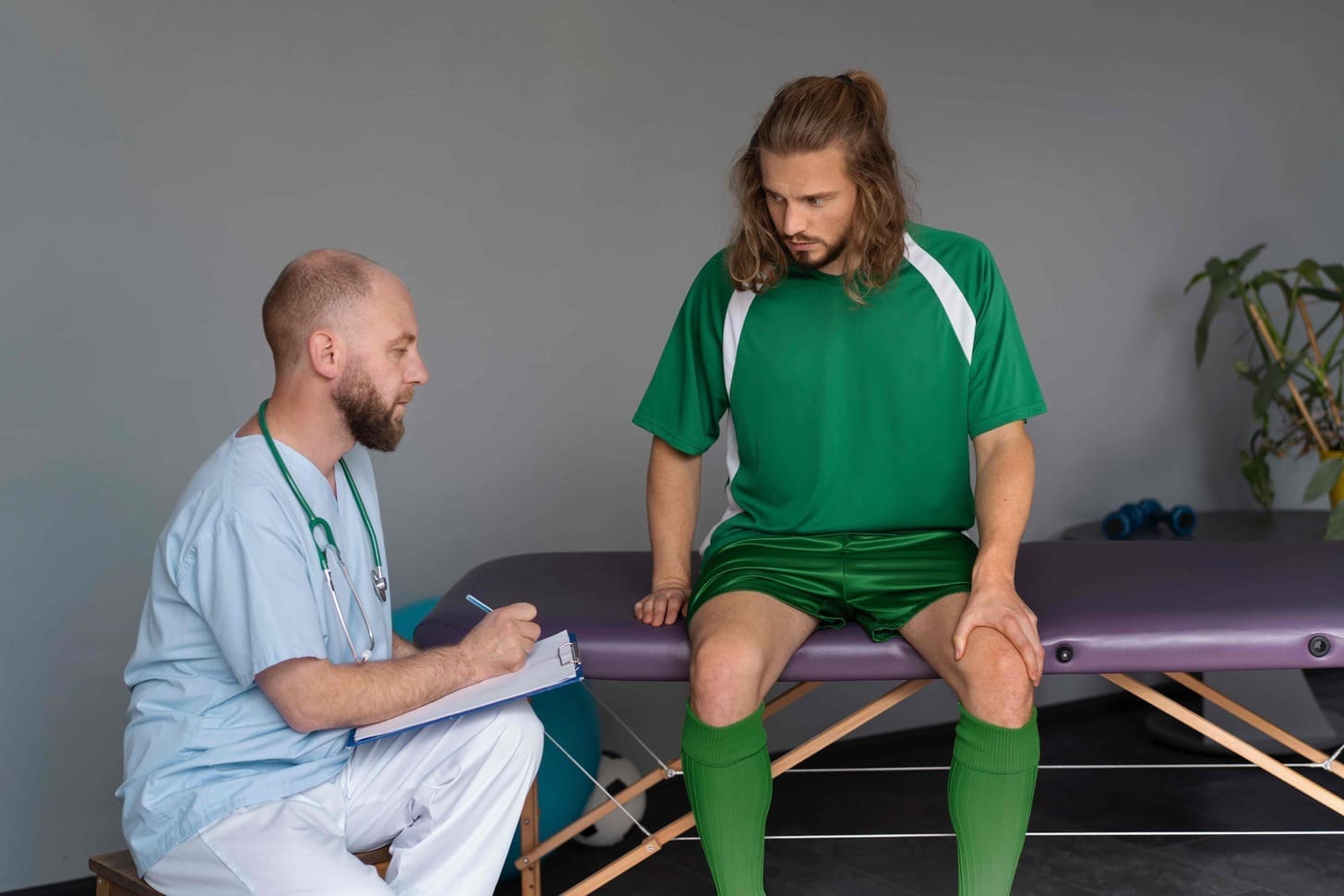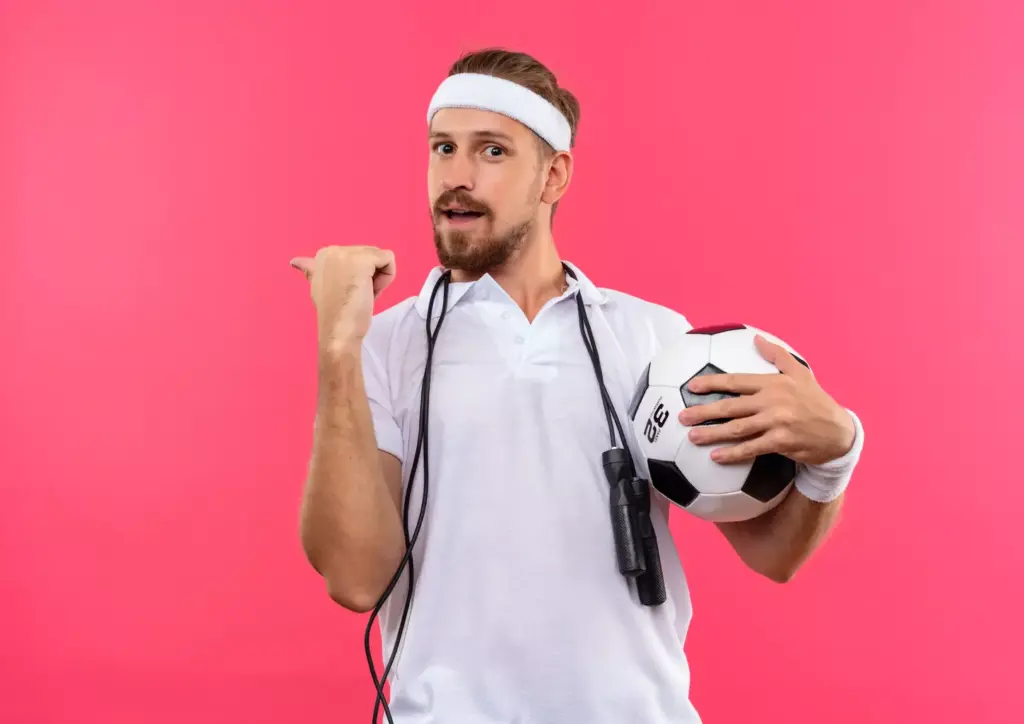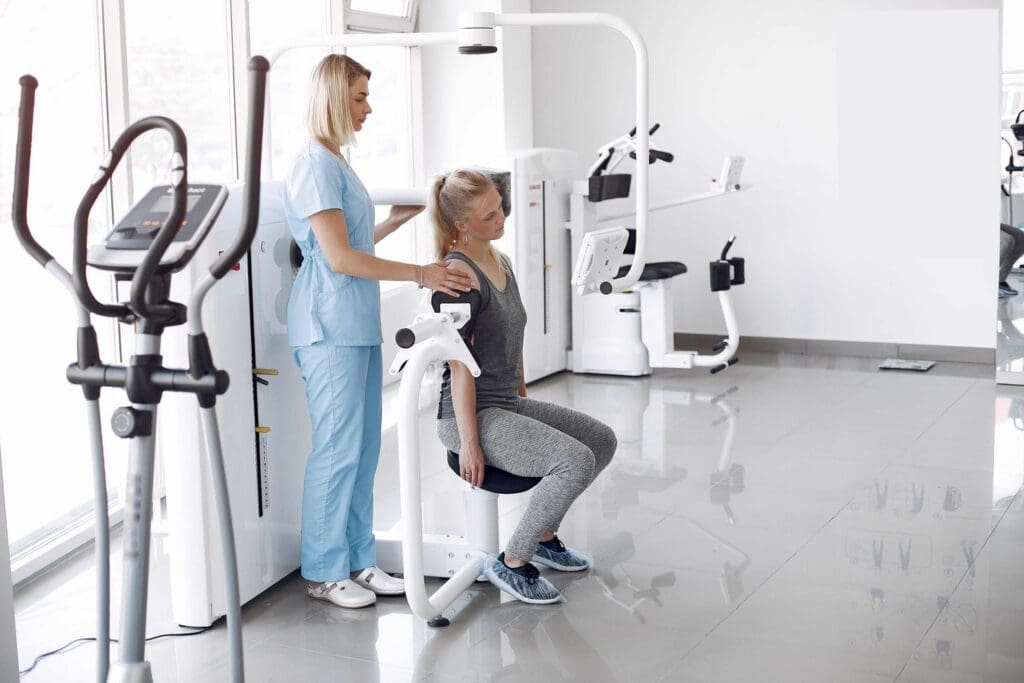
Liv hospital aim to give top-notch healthcare to people all over the world. We dive into sports medicine, a key part of medicine. It deals with keeping fit, preventing injuries, and fixing them from sports and exercise.
Studies show more people are linking sports and medicine for better health and performance. So, what is sports medicine? It’s a mix of many medical areas. They all work together to keep athletes and active people healthy and improve their skills.

Sports medicine is all about using medical knowledge to help athletes perform better, avoid injuries, and recover faster. It’s a field that brings together many medical areas to give athletes and active people the care they need.
The definition of sports medicine covers caring for athletes and active people. It focuses on managing injuries and boosting athletic performance. We take a whole-body approach, looking at physical, mental, and nutritional health.
This approach is based on the latest research and medical practices. It ensures athletes get the best care and advice.
Research shows that exercise keeps your immune system young as you get older. This shows how vital sports medicine is. It’s not just about treating injuries but also about keeping people healthy through exercise.
Sports medicine has grown a lot over time. It started with treating sports injuries and now includes preventing injuries, improving performance, and helping with recovery. Today, it’s a key part of healthcare.
We’ve moved towards more prevention and sports medicine is now part of regular medical care. This change shows how important staying active is for health. It also highlights the need for medical care that meets athletes’ and active people’s needs.

Sports medicine uses a team of healthcare experts to help athletes perform better and stay healthy. This team approach makes sure athletes get all the care they need. They focus on the athlete’s physical, medical, and mental health.
Sports medicine covers many areas of medical care. Physicians who specialize in sports medicine are key in diagnosing and treating injuries. They work with physical therapists and athletic trainers to create rehab plans for each athlete.
This field also includes preventing injuries, improving performance, and teaching healthy living. Sports medicine experts give advice on diet, training, and recovery to help athletes do their best.
The science behind sports medicine comes from research and proven practices. Studies help us understand sports injuries and how to prevent and treat them. This knowledge leads to better ways to keep athletes safe and healthy.
Research in sports medicine looks at many topics, like how injuries happen and what affects athlete performance. By keeping up with new research, sports medicine experts can give top-notch care to each athlete.
As sports medicine grows, new technologies and research methods will help us learn more. This will lead to even better care and performance for athletes.
The sports medicine team is made up of many healthcare experts. They work together to help athletes and active people. This team approach ensures athletes get the best care for their health and performance.
Sports medicine doctors and orthopedic specialists are key in treating sports injuries. Sports medicine physicians handle many medical issues athletes face. Orthopedic specialists focus on surgery and complex bone and muscle problems.
Experts like Amesh A. Adalja, MD, say a full approach to athlete care is vital. This includes both medical and orthopedic help.
Athletic trainers meet athletes first when they get hurt. They know how to care for injuries right away and prevent them. Physical therapists help athletes get back to full strength after an injury. They use proven methods to do this.
Nutritionists and exercise physiologists help athletes perform better. Nutritionists advise on diet and nutrition for training and recovery. Exercise physiologists create workout plans that meet an athlete’s needs and goals.
A sports medicine degree helps professionals in these fields. It gives them the skills to support athletes well.
Sports psychologists are important for athletes’ mental health. They help athletes deal with stress and overcome mental blocks. Rehabilitation experts, like physical therapists, help athletes regain their abilities after injury.
These experts work together as a team. They meet athletes’ needs, from preventing and treating injuries to improving performance and overall health.
Sports medicine has many specializations, each focusing on different areas of athlete care. These areas help athletes perform better and stay healthy. They are key to supporting athletes and those who are active.
Orthopedic sports medicine deals with sports injuries to the bones and muscles. Orthopedic surgeons and sports medicine doctors work together. They treat injuries like fractures and tendonitis with surgery or other methods.
Rehabilitation sports medicine helps athletes get back to their game after injuries. It involves physical therapists, athletic trainers, and others. They create plans to help athletes regain strength and function.
Performance-based sports medicine aims to improve athletic performance. Exercise physiologists and sports nutritionists are part of this field. They use science and training to boost athletes’ strength and endurance.
| Specialization | Focus Area | Key Professionals |
|---|---|---|
| Orthopedic Sports Medicine | Diagnosis and treatment of musculoskeletal injuries | Orthopedic surgeons, sports medicine physicians |
| Rehabilitation Sports Medicine | Recovery and rehabilitation programs for athletes | Physical therapists, athletic trainers, rehabilitation specialists |
| Performance-Based Sports Medicine | Enhancing athletic performance through scientific methods | Exercise physiologists, sports nutritionists |
Knowing about sports medicine specializations is important. It helps athletes, coaches, and healthcare providers. Each specialization plays a unique role in supporting athletes.
Understanding preventative sports medicine helps us see its role in keeping athletes healthy. It’s key in athlete care, aiming to stop injuries and keep performance high.
Injury prevention is central to preventative sports medicine. Effective methods include good warm-ups, right equipment, and checks for biomechanical issues early on.
Research shows special training programs can cut down injury risks. For example, exercises that strengthen the core and improve flexibility can prevent overuse injuries.
Optimizing training is also vital in preventative sports medicine. Customizing training to fit an athlete’s needs boosts performance and lowers injury risk.
Periodization is a key training strategy. It involves planning training phases to peak at the right time. This helps avoid overtraining and keeps athletes performing their best when it counts.
Long-term athlete development is more than just performance. It’s about keeping athletes healthy and well over their careers. Holistic development programs that include nutrition, mental health support, and injury prevention are vital.
Studies show endurance exercise can boost the immune system. This underlines the need for preventative sports medicine. By focusing on long-term health, athletes can enjoy lasting success and a healthier life after sports.
Getting injuries right is key in sports medicine. It helps prevent long-term damage and keeps athletes safe. This field deals with injuries and conditions from sports, needing a team effort.
Acute injuries like fractures, sprains, and strains are common. Quick and correct diagnosis and treatment are vital. For example, knowing the exact injury in the knee can greatly affect treatment and recovery.
Common acute injuries include:
It’s important to treat these injuries fast and right. Treatment can be rest, physical therapy, or sometimes surgery.
| Injury Type | Common Diagnosis Methods | Treatment Options |
|---|---|---|
| Ankle Sprain | Physical examination, X-ray | Rest, Ice, Compression, Elevation (RICE), Physical Therapy |
| Knee Ligament Injury | MRI, Physical examination | Physical Therapy, Bracing, Surgery |
| Muscle Strain | Physical examination, Ultrasound | RICE, Physical Therapy, Pain Management |
Chronic conditions and overuse syndromes are common too. Tendinitis and stress fractures come from too much stress. We focus on managing these to avoid more harm and help healing.
Management strategies include:
Concussions are a big worry in sports medicine. We follow strict concussion protocols for safety. Diagnosing a concussion means checking symptoms and brain function.
Return-to-play guidelines typically involve:
Being careful about when to let athletes play again is vital. It helps prevent more injuries and keeps them healthy long-term.
Sports medicine is used in many places, like elite sports, schools, and community groups. It shows how important and flexible sports medicine is. It helps athletes and active people in many ways.
In elite sports, sports medicine is key for better performance, injury prevention, and managing health issues. A sports medicine expert, says it has changed how athletes train and recover. Advanced tests and new treatments help athletes stay top-notch.
In schools, sports medicine aims to prevent injuries, treat them quickly, and help athletes recover. Young athletes need special care. Programs include injury prevention, concussion rules, and strength training for teens.
“Sports medicine in schools is about safety, wellness, and peak performance,” says Jane Doe, an athletic trainer.
Sports medicine helps recreational athletes and active people prevent injuries, get better, and stay healthy. This group has different needs than pros. We offer custom workouts, injury prevention, and treatments for common injuries.
Sports medicine meets the needs of athletes and active people in many settings. It’s valuable for everyone, from pros to hobbyists. Sports medicine has something for everyone.
The sports world is growing fast, and so is the need for sports medicine experts. A sports medicine degree gets you ready for jobs in healthcare and sports. It’s a path to many careers.
Getting a sports medicine degree means learning in class and getting hands-on experience. The exact steps depend on your future job in sports medicine.
In sports medicine, staying updated is key. You can get certified by groups like the American Board of Medical Specialties (ABMS) or the National Athletic Trainers’ Association (NATA).
A sports medicine degree opens doors to many jobs. Here are a few:
Experts say education and ongoing learning are vital in sports medicine. As the field expands, so will the job chances for those with a sports medicine degree.
The field of sports medicine is always changing. This is thanks to new research and better ways to manage injuries and improve performance. We’ve seen how sports medicine covers many areas, from medical care to scientific studies.
It’s key to mix medicine and sports to keep athletes healthy and performing well. Studies show how important sports medicine is for treating injuries and long-term health issues.
As sports medicine grows, we’ll see more new ideas in preventing injuries, diagnosing problems, and treating them. The team effort in sports medicine is vital for giving athletes the best care.
Understanding sports medicine helps us see its big role in keeping people healthy, improving performance, and boosting overall well-being.
Sports medicine is a field that helps prevent, diagnose, and treat injuries and illnesses from sports and physical activities. It involves many medical specialties and healthcare professionals. They work together to care for athletes and active people.
The sports medicine team includes doctors, orthopedic specialists, athletic trainers, and physical therapists. Nutritionists, exercise physiologists, sports psychologists, and rehabilitation experts also play key roles. Each member is important for athlete care.
Sports medicine has specializations like orthopedic sports medicine and rehabilitation sports medicine. Performance-based sports medicine is another area. Each focuses on different aspects, like surgery, rehabilitation, or improving performance.
Preventative sports medicine uses strategies to prevent injuries and illnesses in athletes. It includes injury prevention, training optimization, and helping athletes develop over time.
In high school and college, sports medicine provides care and support to student-athletes. Professionals in these settings prevent injuries, diagnose and treat conditions, and help athletes recover.
A sports medicine degree is an educational program in sports medicine. It can be at the undergraduate or graduate level. It prepares students for careers in sports medicine, athletic training, and physical therapy.
Careers in sports medicine include being a sports medicine physician, athletic trainer, or physical therapist. Other roles include sports psychologist and rehabilitation expert. You can also work in sports organizations, hospitals, clinics, or private practices.
In professional and elite sports, sports medicine provides medical support and care. It includes preventing injuries, diagnosing and treating conditions, and improving performance. It also involves rehabilitation to help athletes recover.
Common acute sports injuries include sprains, strains, fractures, and concussions. Managing these injuries involves immediate care, diagnosis, and treatment. Rehabilitation is also key to help athletes get back to play.
Concussion protocols are vital in sports medicine for safe concussion diagnosis, treatment, and management. They include removing athletes from play, diagnosis, and rehabilitation. These protocols help athletes recover from concussions and prevent long-term damage.
Sports medicine is a field that helps prevent, diagnose, and treat injuries and illnesses from sports and physical activities. It involves many medical specialties and healthcare professionals. They work together to care for athletes and active people.
The sports medicine team includes doctors, orthopedic specialists, athletic trainers, and physical therapists. Nutritionists, exercise physiologists, sports psychologists, and rehabilitation experts also play key roles. Each member is important for athlete care.
Sports medicine has specializations like orthopedic sports medicine and rehabilitation sports medicine. Performance-based sports medicine is another area. Each focuses on different aspects, like surgery, rehabilitation, or improving performance.
Preventative sports medicine uses strategies to prevent injuries and illnesses in athletes. It includes injury prevention, training optimization, and helping athletes develop over time.
In high school and college, sports medicine provides care and support to student-athletes. Professionals in these settings prevent injuries, diagnose and treat conditions, and help athletes recover.
A sports medicine degree is an educational program in sports medicine. It can be at the undergraduate or graduate level. It prepares students for careers in sports medicine, athletic training, and physical therapy.
Careers in sports medicine include being a sports medicine physician, athletic trainer, or physical therapist. Other roles include sports psychologist and rehabilitation expert. You can also work in sports organizations, hospitals, clinics, or private practices.
In professional and elite sports, sports medicine provides medical support and care. It includes preventing injuries, diagnosing and treating conditions, and improving performance. It also involves rehabilitation to help athletes recover.
Common acute sports injuries include sprains, strains, fractures, and concussions. Managing these injuries involves immediate care, diagnosis, and treatment. Rehabilitation is also key to help athletes get back to play.
Concussion protocols are vital in sports medicine for safe concussion diagnosis, treatment, and management. They include removing athletes from play, diagnosis, and rehabilitation. These protocols help athletes recover from concussions and prevent long-term damage.
Subscribe to our e-newsletter to stay informed about the latest innovations in the world of health and exclusive offers!